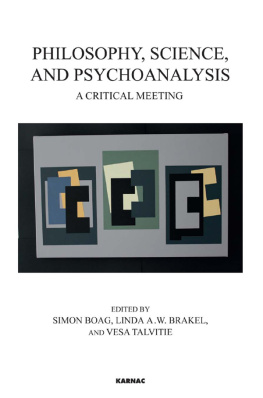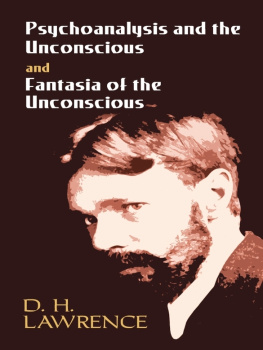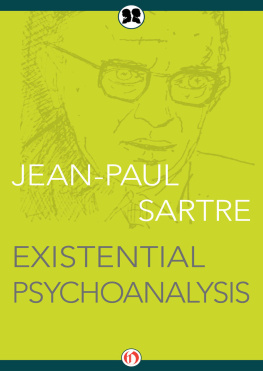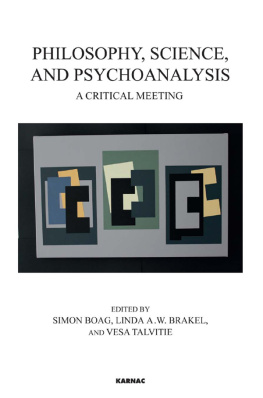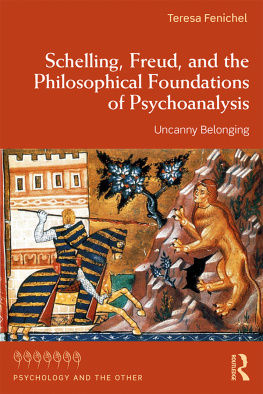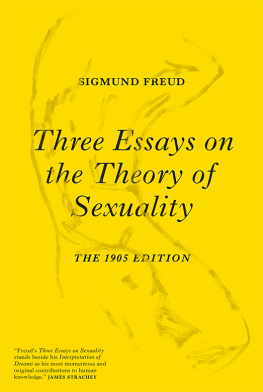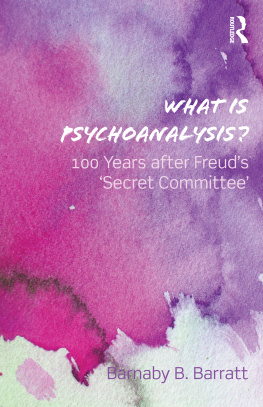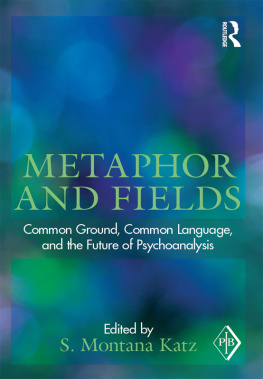ABOUT THE EDITORS AND CONTRIBUTORS
Simon Boag is a senior lecturer in psychology at Macquarie University where he teaches personality theory, research methods, and the history and philosophy of psychology. He has published extensively in the area of Freudian repression and unconscious mental processes, philosophy of mind, and conceptual research, and is the author of Freudian Repression, the Unconscious, and the Dynamics of Inhibition (Karnac). He can be contacted at: .
Linda A. W. Brakel is associate professor (adjunct) of psychiatry, and research associate in philosophy at the University of Michigan. She is also on the faculty of Michigan Psychoanalytic Institute, and practices psychoanalysis in Ann Arbor, Michigan. She has authored and co-authored articles on topics ranging from empirical studies testing psychoanalytic concepts to those on the philosophy of mind and action. Her most recent works are three interdisciplinary books: Philosophy, Psychoanalysis, and the A-Rational Mind (Oxford), Unconscious Knowing and Other Essays in Psycho-Philosophical Analysis (Oxford), and The Ontology of Psychology: Questioning Foundations in the Philosophy of Mind (Routledge). She can be contacted at: .
Anna Ursula Dreher is a psychoanalyst and supervisor in private practice in Frankfurt am Main, Germany, and a member of the research committee of the International Psychoanalytic Association (subcommittee: clinical research). She is the author of Foundations for Conceptual Research in Psychoanalysis (Karnac) and co-editor of several volumes including Pluralism and Unity? Methods of Research in Psychoanalysis (IPA). She can be contacted at: .
Edward Erwin is professor of philosophy at the University of Miami. He is the editor of The Freud Encyclopedia: Theories, Therapy, and Culture (Routledge), co-editor of Ethical Issues in Scientific Research (Taylor & Francis) with Sidney Gendin and Lowell Kleiman, and the author of The Rejection of Natural Science Approaches to Psychotherapy (VDM Publishing), Behavior Therapy: Scientific, Philosophical and Moral Foundations (Cambridge University Press), Philosophy and Psychotherapy: Razing the Troubles of the Brain (Sage), and A Final Accounting: Philosophical and Empirical Issues in Freudian Psychology (M.I.T. Press). He can be contacted at: .
Adolf Grnbaum is Andrew Mellon professor of philosophy of science, research professor of psychiatry, and primary research professor in the Department of History and Philosophy of Science at the University of Pittsburgh. He is the author of many books and papers on the philosophy of science and psychoanalysis including The Foundations of Psychoanalysis: A Philosophical Critique (University of California Press) and Validation in the Clinical Theory of Psychoanalysis: A Study in the Philosophy of Psychoanalysis (International Universities Press). He can be contacted at: .
Agnes Petocz is a senior lecturer in the School of Social Sciences and Psychology at the University of Western Sydney, where she teaches courses in the history and philosophy of psychology and critical thinking. She is the author of Freud, Psychoanalysis and Symbolism (Cambridge University Press), has published on various topics in the philosophy of psychology, and is co-editor with Nigel Mackay of Realism and Psychology: Collected Essays (Brill). She can be contacted at: .
Vesa Talvitie is a doctor of psychology, licensed psychotherapist, organisational consultant (FINOD), and currently works as an occupational .
Thomas Wallgren is a senior lecturer and docent of philosophy at the University of Helsinki. He is the author of Transformative Philosophy: Socrates, Wittgenstein, and the Democratic Spirit of Philosophy (Lexington), and the director of the research project A science of the soul? Wittgenstein, Freud and Neuroscience in dialogue (Academy of Finland 20102013). He is also the director of The von Wright and Wittgenstein Archives at the University of Helsinki. He can be contacted at: .
CHAPTER ONE
Critique of Psychoanalysis
Adolf Grnbaum
I. Introduction
The most basic ideas of psychoanalytic theory were initially enunciated in Josef Breuer's and Sigmund Freud's Preliminary Communication of 1893, which introduced their Studies on Hysteria. But the first published use of the word psychoanalysis occurred in Freud's 1896 French paper on Heredity and the aetiology of the neuroses (1896a, p. 151). Therein Freud designated Breuer's method of clinical investigation as a new method of psycho-analysis. Breuer used hypnosis to revive and articulate a patient's unhappy memory of a supposedly repressed traumatic experience. The repression of that painful experience had occasioned the first appearance of a particular hysterical symptom, such as a phobic aversion to drinking water. Thus, Freud's mentor also induced the release of the suppressed emotional distress originally felt from the trauma. Thereby Breuer's method provided a catharsis for the patient.
The cathartic lifting of the repression yielded relief from the particular hysterical symptom. Breuer and Freud believed that they could therefore hypothesise that the repression, coupled with affective suppression, was the crucial cause for the development of the patient's psychoneurosis (1895d, pp. 67, 2930).
Having reasoned in this way, they concluded in Freud's words:
Thus one and the same procedure served simultaneously the purposes of [causally] investigating and of getting rid of the ailment; and this unusual conjunction was later retained in psycho-analysis. (1924f, p. 194)
In a 1924 historical retrospect (1924f, p. 194), Freud acknowledged the pioneering role of Breuer's cathartic method:
The cathartic method was the immediate precursor of psychoanalysis; and, in spite of every extension of experience and of every modification of theory, is still contained within it as its nucleus.
Yet Freud was careful to highlight the contribution he made himself after the termination of his collaboration with Breuer. Referring to himself in the third person, he tells us:
Freud devoted himself to the further perfection of the instrument left over to him by his elder collaborator. The technical novelties which he introduced and the discoveries he made changed the cathartic method into psycho-analysis. (1924f, p. 195)
These extensive elaborations have earned Freud the mantle of being the father of psychoanalysis.
By now, the psychoanalytic enterprise has completed its first century. Thus, the time has come to take thorough critical stock of its past performance qua theory of human nature and therapy, as well as to have a look at its prospects. Here I can do so only in broad strokes.
It is important to distinguish between the validity of Freud's work qua psychoanalytic theoretician, and the merits of his earlier work, which would have done someone else proud as the achievement of a life-time. Currently, Mark Solms, working at the Unit of Neuro-surgery of the Royal London Hospital (Whitechapel) in England, is preparing a five-volume edition of Freud's Collected Neuroscientific Writings for publication in all of the major European languages. One focus of these writings is the neurological representation of mental functioning; another is Freud's discovery of the essential morphological and physiological unity of the nerve cell and fibre. They also contain contributions to basic neuroscience such as the histology of the nerve cell, neuronal function and neurophysiology. As a clinical neurologist, Freud wrote a major monograph on aphasia (Solms & Saling, 1990). As Solms points out in his preview

